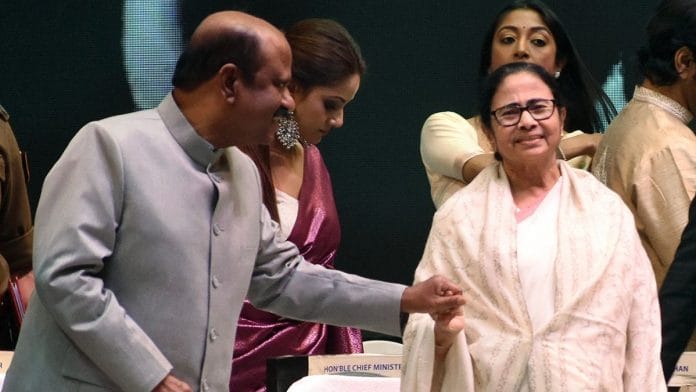In the battle for control of West Bengal’s universities, it’s not yet clear if the chief minister or the Governor will win. But the loser is easy to spot: the student.
The story of Sayan Karmakar is one such widely shared instance of collateral damage. He did a course in photography from a college in Kolkata under West Bengal State University and applied for the job of a photographer at DRDO with all his marksheets. He scored a 100 percentile in the DRDO exam. However, during document verification, DRDO asked for his diploma certificate. Karmakar didn’t have it. When he went to the university for it at the end of May they told him that it wouldn’t be possible since they had no Vice Chancellor and thus no one to sign the certificate.
Karmakar wrote to UGC and Raj Bhavan in vain. Towards the end of August, he stood outside Raj Bhavan hoping something would give. Something did. A popular Bengali website reported his plight, the governor appointed an interim VC on 31 August. The VC signed Karmakar’s diploma certificate on 4 September. The young man is now in Pune for the last mile sprint for his dream job.
Days after the Governor appointed interim vice-chancellors to 16 state universities without consulting the state government, Mamata Banerjee, on Teachers’ Day, warned that if he, as a nominated head of the state, kept overstepping his authority, then she, as an elected leader, would financially cripple the state universities he was trying to control.
“If you interfere with any university or if any university or college takes your orders, I will create economic obstructions. Tit for tat. No compromise. Let me see how you pay the salaries of university staff,” she said.
The Governor issued a response on video. Speaking in Bengali he basically said, bring it on.
Also Read: West Bengal will have its second birthday. Mamata Banerjee has again put BJP on back foot
Universities, a new battleground
The two had got off to a great start. When Mamata Banerjee was given an honorary doctorate by St Xaviers University in February, the Governor, who had set up residence at Raj Bhavan in November 2022, had high praise for her. He spoke of her in the same breath as — Winston Churchill, John Milton and APJ Abdul Kalam.
But friction erupted between them in no time.
There is a long history to this friction and differences over the appointment of VCs are only one of many manifestations. It emanates from the fact that education is on the concurrent list of the Constitution and has been a playground for Centre versus state control forever, especially when it is not a double-engine sarkar. Added to that is the fact that Governors hold the position of chancellor for all State universities.
In the context of educational governance, the situation in West Bengal’s universities is further complicated by the rise of alternative educational institutions. For instance, many parents are increasingly turning to RSS-run schools due to dissatisfaction with the state education system, which has been criticized for its declining quality and lack of resources.
But in the immediate context, let’s go back to January 2020, when then Governor of West Bengal and now Vice President, Jagdeep Dhankhar called a meeting of vice-chancellors of the state’s universities. Not a single vice-chancellor showed up, clearly not willing to offend the state government which pays the bills.
The tussle went south in June last year when the West Bengal government tabled a bill in the Assembly that said the chief minister, not the Governor, will henceforth be chancellor of all universities in the state. The bill sailed through in the Assembly but has, perhaps expectedly, not been signed by the Governor.
Also Read: INDIA 2024 fault line goes via five states. But Mamata Banerjee is showing the way
Centre first
A series of events that followed exacerbated the situation. The state education minister Partha Chatterjee was arrested by the Enforcement Directorate in July last year in connection with a teacher recruitment scam. Then, in October, the Supreme Court upheld a Calcutta High Court verdict which underlined that the state had no authority to appoint or reappoint the vice-chancellor of the iconic Calcutta University. The state could not have been happy with the decision.
This August came the tragic death of a first-year student at Jadavpur University’s hostel. At the time of the incident, the university did not have a vice chancellor and Bose appointed one on 21 August, allegedly without the due process of going through a search committee. That this new interim VC allegedly had BJP-RSS links was also an issue.
On the midnight of 3 September, Bose released a list of 16 interim VCs across the state. A day after Mamata Banerjee issued her threat to sit on dharna at Raj Bhavan and cut off funds to universities, he appointed one more VC.
Earlier this month, Raj Bhavan also issued a notification saying all teaching and non-teaching staff of universities were answerable to the Chancellor and VC first. The state government’s orders were not binding.
While Karmakar’s case of nearly missing a job because there was no VC to sign his certificate may be one of a kind, students at colleges under the state’s 31 universities are feeling the pinch. Some are reporting delays in semester exams leading to shorter semesters, fewer classes, irregular classes, and stagnant syllabi. Teachers are at their wit’s end with sluggish administrative decisions, especially as they grapple with the challenge of implementing the New Education Policy.
The last thing they need is political warfare. But with no end in sight to the Bose vs. Banerjee clash, that is what West Bengal’s university students are getting.
The author is a senior journalist based in Kolkata. She tweets @Monideepa62. Views are personal.
(Edited by Theres Sudeep)






